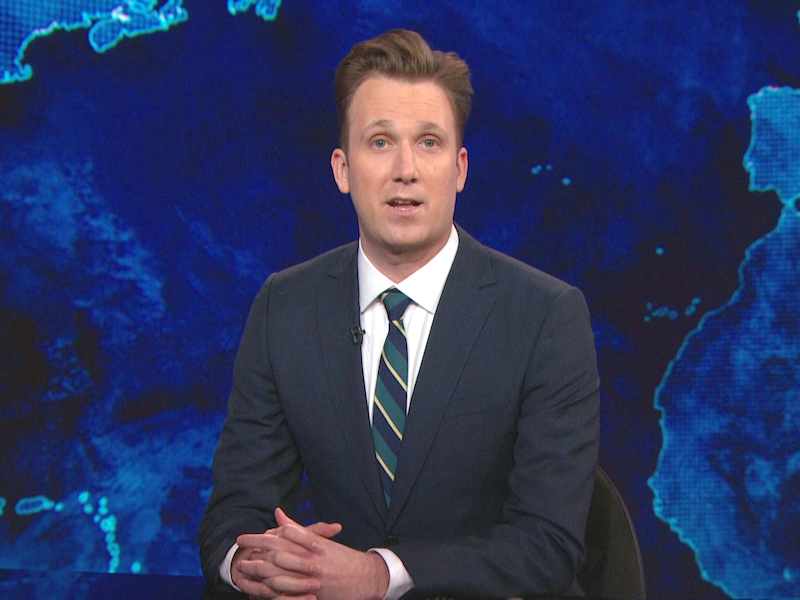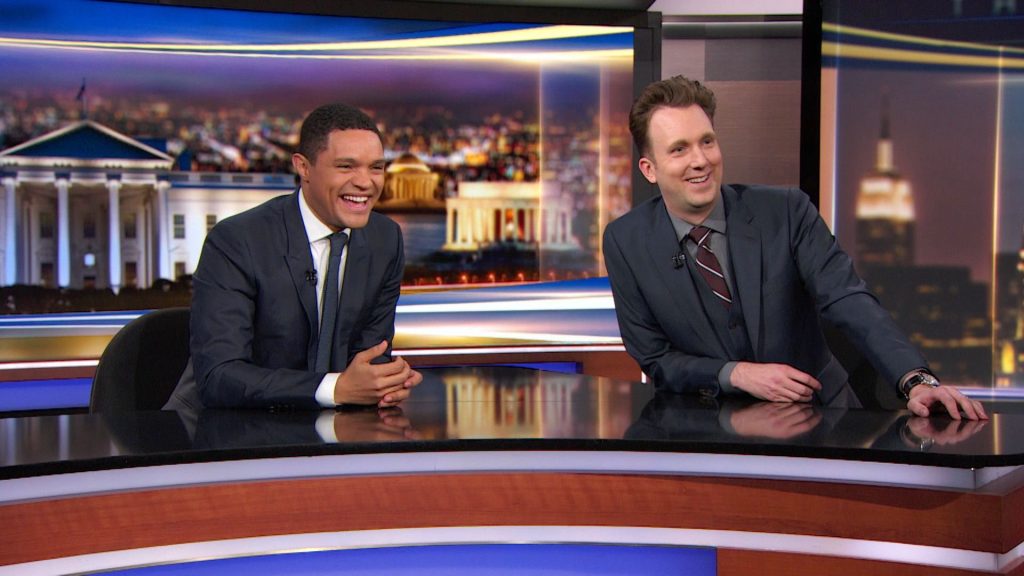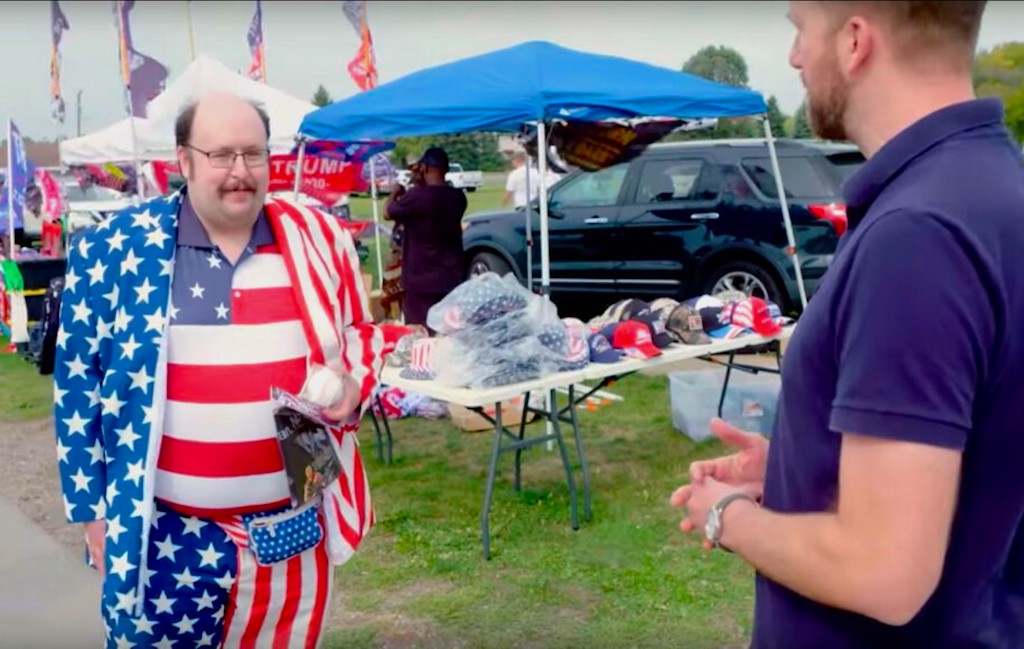Many comedians have entertained audiences with political commentary rich in biting satire which cuts close to the bone. Such satirists include Jon Stewart, Stephen Colbert, Trevor Noah, John Oliver, and Jordan Klepper.
Klepper cut his teeth in stand-up comedy at Second City and Upright Citizens Brigade and he’s also the official Daily Show correspondent and interviews regular people on current affairs.
Michigan-born Jordan Klepper recently wrote and produced a special on The Daily Show called Jordan Klepper Fingers the Globe: Hungary for Democracy. The Emmy-nominated special on Comedy Central takes an unflinching look at how the GOP has become enamored with Hungary as a template for its political palette. We spoke with Jordan about his special and his improvisational comedic process.
When you studied abroad in London, what did you study?
I got into Kalamazoo College on a math scholarship. I was an analytical thinker who was good at math, but knew I didn’t want to become a mathematician. I took the scholarship to see if I could pay for college and find something else, I liked. I stumbled upon theater and improvisational comedy and fell in love with them. That took me to London for a couple of semesters. I was able to jump into the theater scene there. I was able to learn not only about London, but what it’s like to live abroad and to fall in love with British comedy, which I love dearly to this day.

Jordan Klepper
What are the primary differences between British and American comedy?
It felt like British comedy didn’t have a problem punching harder at themselves. American exceptionalism is something that permeates a lot of our media. With Ricky Gervais’s character in The Office, he was loathing in a way that American audiences wouldn’t respond to. I always thought what was funny about characters like him, Alan Partridge, and David Brent from The Office was that they were despicable. They weren’t afraid to show their ugly sides in a way that I thought was compelling and interesting, but as funny as you could get.
As far as performing, have you ever frozen on stage?
I’ve definitely had my times where there’s nothing there and I’ve had my fair share of bombs that have happened on stage. But I’ve been lucky that improvisation was my first love in performing. What it teaches you is to embrace that moment. In silence or weirdness, there’s something there to be mined. I can’t say I’ve always been successful with it. In fact, rarely have I been successful with it. Improv is the art of dying on stage. It has given me the ability to not freeze and instead enjoy the bomb and find something in it.
What’s the most painful joke you’ve ever told?
Any joke that’s told to a friend that is more criticism than it is joke, I think you run the risk of hurting someone. That’s perhaps the evil crutch that a lot of comedians have. In awkward personal moments, you may turn to comedy and say that thing you didn’t want to say to that person’s face. So, you always have to be careful when you have that tool in your tool belt.
When you auditioned for The Daily Show, how did you prepare?
It’s a pretty arduous audition. You have to memorize a piece, what they call a “chat” with Jon. Then you have to write a piece as well. I did that process; they liked it. They called me in and had me do it again. You’re essentially flexing your writing muscles. You’re trying to get that right and, in your voice, but also in the voice of the show. You’re binging as much as you can on The Daily Show and the rhythms and writings that they have. Then as a performer you’re trying to stay as loose and true to it. I was auditioning for a correspondent role and that serves a very specific purpose. I was taking over for John Oliver. You have these unique, interesting voices on this show that also had to speak in the voice of the show. That comes with preparation but also trusting your gut that your voice is unique enough that it can fit and still have something to say.
Is there a writers’ room for The Daily Show?
There is. Traditionally, The Daily Show has a writers’ room where you show up in the morning and everybody is pitching ideas, talking about what’s happening in the day. If you have a piece that day, you get set off that day and you’re working with a writer on crafting those chats or that piece that day. And if you’re not, you jump into the field department, where there are producers that serve as writers as well and you prep field pieces. Those have a slightly more improvisational feel, but you’re crafting what the story is going to be, the questions you might ask the people when you hit the road, and how you might tell that story when you come back.

Trevor Noah & Jordan Klepper on The Daily Show
How do you all come up with fresh ideas?
The best thing about writing in an environment like The Daily Show is that you’re surrounded by creative people. You get into a room with those people and you’re bouncing fun, interesting things around. Especially during COVID when we weren’t in a room like that together, you missed it most. There’s still no replicating being in a room with interesting people trying to make an idea better.
Let’s talk about Jordan Klepper Fingers the Globe: Hungary for Democracy. How did that come about?
We were reading story after story about Hungary, and it kept coming up in the American political discourse. Then it was announced that CPAC, which is representative of where the Republican party is going, decided they were going to Budapest. For us, we thought, there’s something happening in Hungary that is reflective about what the conservative movement in America is aiming towards. Let’s go international and see if there’s a way to expand what we do here on The Daily Show and what I do out on the road into a special that has an international perspective on it so audiences can see these democratic norms that are shifting here in America, they’re also shifting and perhaps crumbling in other countries as well and we should take heed.
The metaphor they kept using was the frog in the boiling water
Why do you think they’re embracing right-wing nationalism in Hungary?
You see a lot of the playbooks that the conservatives of America are adopting are the ones that Viktor Orbán has been adopting for a while. He’s stripped away certain powers at the voting booth so it’s harder to change certain power structures that are already there. He’s vilified groups, and people like George Soros he’s suddenly made a boogeyman.
He made liberalism a boogeyman there. He made the LGBTQ community a boogeyman by crafting laws that suddenly made their relationships illegal, which affected not only the ways in which they could adopt children, but also the ways in which people saw LGBTQ communities there. It’s the slow taking away of rights. Creating a society of Us vs Them that Orbán has taken advantage of. When you stoke that fear and create the US vs THEM, you suddenly speak to a population who is scared, who is quickly running towards the US.
What was the most surprising thing you learned during filming?
Unfortunately, we saw heartbreaking stories of thoughtful, interesting people in the LGBTQ who were fleeing, looking to get away because it wasn’t their country anymore. We saw this beautiful university in the middle of Budapest that was empty because Orbán stripped away its rights. Now it has to be overseas. It was depressing to see these changes happen and they happened relatively quickly. A nice surprise was that the war in Ukraine had broken out weeks prior to us arriving and as harrowing as it was to see the refugees coming into Hungary and Budapest, it was inspiring to see the people of Budapest putting down their day-to-day work to try to find a solution. They had a desire to help people in need. That kind of spirit was really refreshing to see.
Regarding U.S. Republicans, why do you think a lot of Trump followers seem to follow him blindly?
I think there are a handful of factors. I think, frankly, a lot of people see this as a game, and they want to be playing the game as long as they can. I think there are a lot of craven folks in positions of power who are scared to death of leaving that position of power – of letting go of that job or that identity that they’ve built around themselves, and in those cowardly moments have flocked to a guy they may or may not agree with.
I think there are also folks who agree with Donald Trump, who maybe want some of the spoils of his successes and will look the other way at some of the transgressions. I do think there are a lot of people who don’t believe in the things that Donald Trump believes in wholeheartedly, but I think their cowardice in wanting to relinquish power is what is a really scary trait.
When I grew up going to school, there was this idea that country comes first and that people would stand up for things because of honor, even when this country was attacked from within. There are only a couple of members of the GOP who are willing to put country first.
What are some of the issues that the Republicans are concerned about?
I think right now it feels like it’s the party of grievance. I’ve gone to rallies recently and it’s shocking to see how far into the conspiratorial world people are going. Social media is making us immune to any outside criticism. You see someone wielding 9/11 conspiracies and election conspiracies at these events and it sends people into these rabbit holes that are scary and dangerous.
I’d like to say that I’m going to these events and there are important issues that are being discussed, but they’re not. What’s being discussed is the grievance, the frustration, and the shutting things down. We should be able to have an open conversation about the climate, about a country that can be sustainable in the future, and it’s being filtered through a lens of gamification. Like the Burn Pits Bill that was being turned down by the GOP for no other reason than not wanting to give the Biden administration a win. That’s just the sign of a broken political system.
What do you think is the current status of democracy in the U.S.?
Tenuous at best. I think a lot of people are frustrated with it. If you strip away belief in institutions and a shared reality, it’s hard to get a country to come together and hold together the ideals of American democracy. I think we’re in a scary place.
How long did it take you to film the special?
We prepped a few months beforehand. Then we went to Budapest ten or twelve days. We had so much material when we came back that we created a special and one-off pieces that we aired on The Daily Show as well to show other sides to stories we didn’t get to go in-depth with on the special.
Did anything embarrassing happen during the filming?
As someone who is a proud American, which means I don’t know any other languages, I quickly became an ugly American there who didn’t only not know other languages, I also have a case of gout, which means eating goulash and drinking beer is a difficult situation for me. I was the ugly American walking into Budapest restaurants asking if they had a meatless option and instead of the beer, did they have any gin that would be good for gout.
What was the writing process like for the special?
The writing perspective for something like this is unique. It’s not a traditionally-written special. What we do is gather a ton of research. Then, the writing becomes crafting a story before you actually film it. We talk to people, we discuss characters we might talk to there, points of view that are happening in that country, things we might want to reflect on.
Then we find spaces where we can go and get the reality on the ground. You write and prep a bunch, then you let it go and just experience. You gather as much as you can, like you would with a good documentary. All the while, day to day we’re still improvising. I’m talking with producers and writers about ways we might craft a story. But again, it is a documentary with a protagonist who is prepped and has a point of view. So, when we finish filming, we bring all of that back and the next phase of writing begins, which is writing in the edit. So, we’re looking through transcripts, piecing this together to tell a clean, efficient story. And then we’re writing voiceovers and connecting things so that the story is clear for an audience.
What’s the main takeaway you want people to have from this special?
I want people to see this special and see that democracy is not something that’s going to be around if you don’t fight for it. There are heartbreaking stories in Hungary that the shifts in democracy are a result of small moves that make the will of the people harder to attain because people in power know how to wield grievances, they know how to shift laws in small ways where suddenly they’re changing the Constitution.
On the surface, it’s still a democracy. They’re still having elections, but they’re having an election where the media landscape is owned by the government. The opposition party gets five minutes of airtime in four years. When Americans talk about this idea of democracy slipping, I think it feels hyperbolic. It’s important to look at places like Hungary where they have elections. Budapest is a beautiful city. But if you look at it closely, minor changes have happened to laws, and the person who wants to stay in power has made it easier to retain it. Americans needs to see these small moves that are anti-democratic as part of a larger picture that could really be detrimental.

